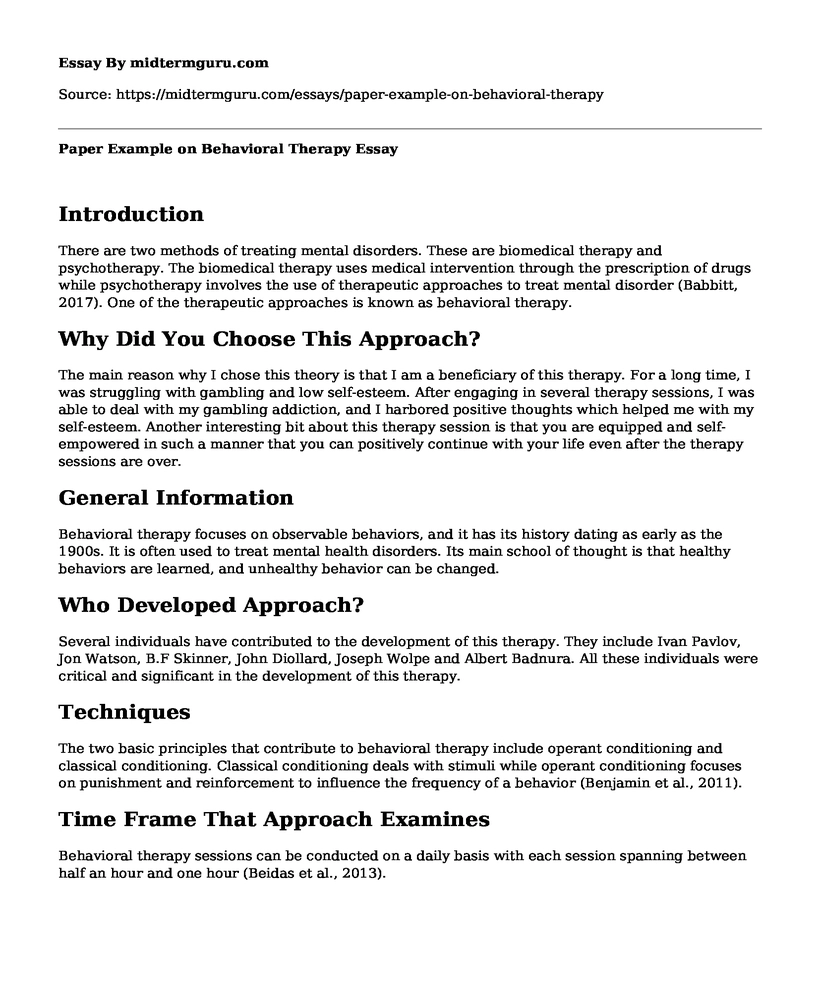Introduction
There are two methods of treating mental disorders. These are biomedical therapy and psychotherapy. The biomedical therapy uses medical intervention through the prescription of drugs while psychotherapy involves the use of therapeutic approaches to treat mental disorder (Babbitt, 2017). One of the therapeutic approaches is known as behavioral therapy.
Why Did You Choose This Approach?
The main reason why I chose this theory is that I am a beneficiary of this therapy. For a long time, I was struggling with gambling and low self-esteem. After engaging in several therapy sessions, I was able to deal with my gambling addiction, and I harbored positive thoughts which helped me with my self-esteem. Another interesting bit about this therapy session is that you are equipped and self-empowered in such a manner that you can positively continue with your life even after the therapy sessions are over.
General Information
Behavioral therapy focuses on observable behaviors, and it has its history dating as early as the 1900s. It is often used to treat mental health disorders. Its main school of thought is that healthy behaviors are learned, and unhealthy behavior can be changed.
Who Developed Approach?
Several individuals have contributed to the development of this therapy. They include Ivan Pavlov, Jon Watson, B.F Skinner, John Diollard, Joseph Wolpe and Albert Badnura. All these individuals were critical and significant in the development of this therapy.
Techniques
The two basic principles that contribute to behavioral therapy include operant conditioning and classical conditioning. Classical conditioning deals with stimuli while operant conditioning focuses on punishment and reinforcement to influence the frequency of a behavior (Benjamin et al., 2011).
Time Frame That Approach Examines
Behavioral therapy sessions can be conducted on a daily basis with each session spanning between half an hour and one hour (Beidas et al., 2013).
What Type of Mental Illnesses Would Be Appropriate to Treat With This Approach?
Behavioral therapies are as effective as medication in the treatment of disorders. It can be used to treat anxiety, panic disorders, addictions, obsessive-compulsive disorder, depression, and other mental problems. It focusses on current problems and aims at finding solutions (Martin, & Pear, 2015) Mechanisms are identified to help the client to be active and productive.
What Types of Items Are Important to Consider in Treatment?
Knowledge of the various principles of behavioral therapy is adequate in addressing disorders. This hence does not advocate for the need to know the origin of the disorders that are being treated in the client.
Summary
The conditioning used is effective in influencing behavioral change based on the treatment being offered. Additionally, it also helps in stopping negative cycles of emotion, thoughts, and behavior and helps the individual to learn how to cope and manage them. More often, the client will have sessions where they are required to replace negative thoughts which can lead to low self-esteem and depression. For instance, 'instead of saying I cannot do this right now' is replaced with 'I have the skills and ability to do this task based on my previous encounter.'
Conclusions
Behavioral therapy represents a therapeutic approach whose model function is effective in providing avenues of intervention. This makes it the treatment of choice for mental disorders among other disorders.
References
Babbitt, I. (2017). Changing frontiers in the science of psychotherapy. Routledge.
Beidas, R.S., Mychailyszyn, M.P., Podell, J.L., & Kendall, P.C. (2013). Brief Cognitive-Behavioral Therapy for Anxious Youth: The Inner Workings. Cognitive and behavioral practice, 20 2, 134-146.
Benjamin, C.L., Puleo, C.M., Settipani, C.A., Brodman, D.M., Edmunds, J.M., Cummings, C.M., & Kendall, P.C. (2011). History of cognitive-behavioral therapy in youth. Child and adolescent psychiatric clinics of North America, 20 2, 179-89.
Martin, G., & Pear, J. J. (2015). Behavior modification: What it is and how to do it. Psychology Press.
Cite this page
Paper Example on Behavioral Therapy. (2022, Oct 04). Retrieved from https://midtermguru.com/essays/paper-example-on-behavioral-therapy
If you are the original author of this essay and no longer wish to have it published on the midtermguru.com website, please click below to request its removal:
- Essay Example: Carlos Problem Which Is Anger
- Individual Change - Paper Example
- Paper Example on Pamphlet Anxiety and OCD
- Statement of Personal Philosophy
- Paper Example on Mental Health Institutions
- The Coddling of the American Mind - Article Analysis Essay
- Personality: A Biological Component Explored by Neuroscience - Research Paper







